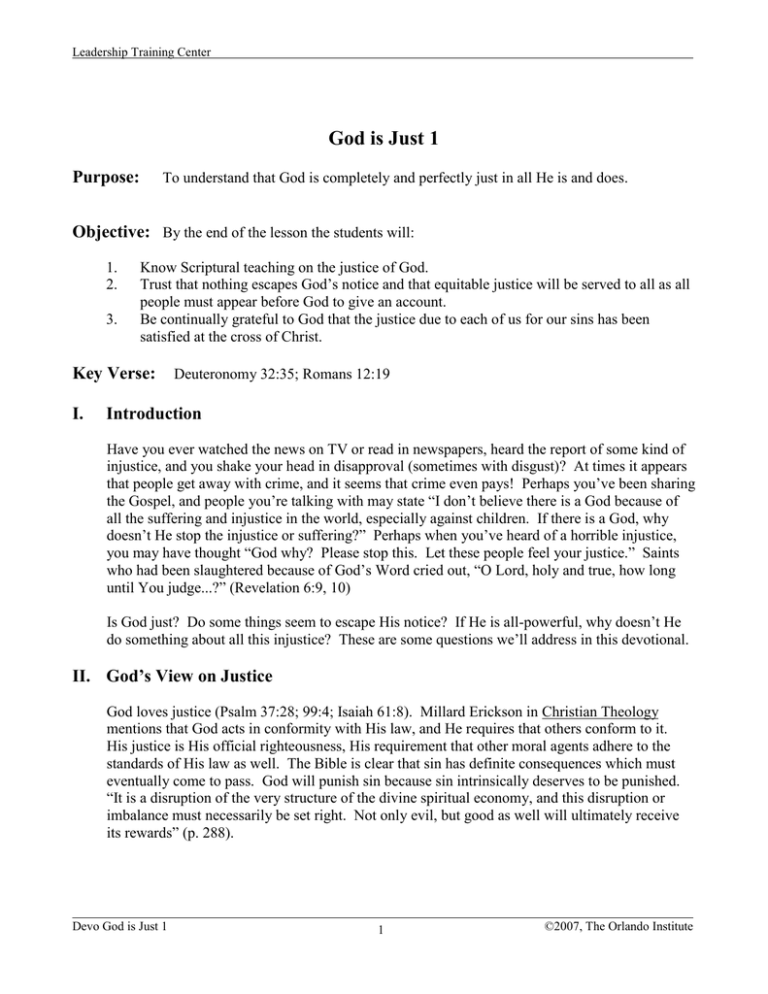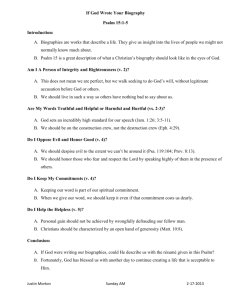God is Just 1 Purpose: Objective:
advertisement

Leadership Training Center God is Just 1 Purpose: To understand that God is completely and perfectly just in all He is and does. Objective: By the end of the lesson the students will: 1. 2. 3. Know Scriptural teaching on the justice of God. Trust that nothing escapes God’s notice and that equitable justice will be served to all as all people must appear before God to give an account. Be continually grateful to God that the justice due to each of us for our sins has been satisfied at the cross of Christ. Key Verse: I. Deuteronomy 32:35; Romans 12:19 Introduction Have you ever watched the news on TV or read in newspapers, heard the report of some kind of injustice, and you shake your head in disapproval (sometimes with disgust)? At times it appears that people get away with crime, and it seems that crime even pays! Perhaps you’ve been sharing the Gospel, and people you’re talking with may state “I don’t believe there is a God because of all the suffering and injustice in the world, especially against children. If there is a God, why doesn’t He stop the injustice or suffering?” Perhaps when you’ve heard of a horrible injustice, you may have thought “God why? Please stop this. Let these people feel your justice.” Saints who had been slaughtered because of God’s Word cried out, “O Lord, holy and true, how long until You judge...?” (Revelation 6:9, 10) Is God just? Do some things seem to escape His notice? If He is all-powerful, why doesn’t He do something about all this injustice? These are some questions we’ll address in this devotional. II. God’s View on Justice God loves justice (Psalm 37:28; 99:4; Isaiah 61:8). Millard Erickson in Christian Theology mentions that God acts in conformity with His law, and He requires that others conform to it. His justice is His official righteousness, His requirement that other moral agents adhere to the standards of His law as well. The Bible is clear that sin has definite consequences which must eventually come to pass. God will punish sin because sin intrinsically deserves to be punished. “It is a disruption of the very structure of the divine spiritual economy, and this disruption or imbalance must necessarily be set right. Not only evil, but good as well will ultimately receive its rewards” (p. 288). Devo God is Just 1 1 ©2007, The Orlando Institute Leadership Training Center III. God is Just (The instructor may want to put students in groups, and assign verses for them to look up. Ask them to describe God’s justice based on the verses they look up. Give them a few minutes to work in their groups, then ask for their answers. Group 1: Psalm 7:11; Psalm 9:4 [answer: He is a righteous judge]. Group 2: Psalm 7:11; Psalm 48:10 [answer: He executes justice daily. His right hand is filled with justice.] Group 3: Psalm 9:8; Psalm 96:13 [answer: He judges the world with righteousness.] Group 4: Psalm 9:8; Psalm 67:4; Psalm 75:2; Psalm 96:10 [answer: He executes justice with fairness.] Group 5: Psalm 98:9; Psalm 99:4; Psalm 119:137 [answer: He executes justice with fairness.] Group 6: Psalm 75:2; Psalm 96:13 [answer: He chooses the time to judge, and he judges with faithfulness.]) Paul referred to the coming judgment as he shared the Gospel (Have a student read Acts 17:31 and another student read Acts 24:24-25). Was he being pushy, harsh or brash to talk about God’s righteous judgment? Think about this: People need to hear that sin has consequences and there will be a judgment for all people. Afterall, a person won’t sense a need for a Savior until they know they have a problem that necessitates a Savior. IV. Justice Satisfied Romans 3:9-20 says that we have a problem called sin. The penalty for sin throughout the Bible has always been death (Genesis 2:17; Ezekiel 18:4, 20; Romans 6:23). That penalty, which separated us from a holy God, was paid by Jesus’ death on the cross (Romans 3:21-26; 5:8; 1 Peter 3:18). That’s why 1 John 1:9 assures the confessing believer that God is faithful and just to forgive us our sins and cleanse us from all unrighteousness. It is just for God to forgive the confessing believer because the payment for all his/her sins were applied to them when they trusted in Christ as Savior and Lord (Colossians 2:13). Jesus, because of His death on the cross for us, has satisfied divine justice. This is called “propitiation” (1 John 2:2; 1 John 4:10; Romans 3:25; Hebrews 2:17). God’s wrath, which we deserve for our sins, has been appeased. Muslims may ask, “Why can’t God simply say, ‘I forgive you’ and it’s all forgiven? Why must there be a death?” Sin is high treason against a holy and just God. His penalty has always been death. To be just, it must be paid. That is God’s justice. In the same way that we require criminals to “pay their debt to society” and go to jail or even be executed, God also requires that the “debt to Him” be paid. That’s bad news! But there is good news! “God’s love was revealed among us in this way: God sent His One and Only Son into the world so that we might live through Him. Love consists in this: not that we loved God, but that He loved us, and sent His Son to be the propitiation for our sins.” 1 John 4:9, 10 This helps to answer the question of how God can be just and loving at the same time. These two attributes seem to contradict each other. How can these two apparent opposites coexist in one Devo God is Just 1 2 ©2007, The Orlando Institute Leadership Training Center person without being schizophrenic (“now He is just but not loving; now He is loving but not just; ad infinitum”)? Millard Erickson mentions that God’s justice is loving justice and love is just love. Love is not fully understood unless we see it as including justice, otherwise it is mere sentimentality (p. 298). At the cross of Christ, we see both. We see the justice of God in that sin’s penalty of death was paid for us. We also see the love of God in that the Father gave His only Son to die for us (John 3:16). We see the love of God in that God was willing to become man and die for us even while we were yet sinners (Philippians 2:5-8; Romans 5:8). Divine justice and divine love in one historical act! Some people may complain, “I don’t think it’s fair that God lets some people go to heaven, and the rest have to go to hell.” What’s not fair is that anyone goes to heaven, because we all deserve God’s condemnation. Actually, it is fair that some go to heaven, because justice was satisfied at the cross. V. Conclusion God is aware of all that happens (Proverbs 15:3; Matthew 10:26-31; 12:36, 37). Everyone must appear before Him – unbelievers (Revelation 20:11-15; 1 Peter 4:3-5) and believers (Romans 14:10-12; I Corinthians 3:11-15). No one will get away with anything. No legal maneuvering will sway Him from judging justly. “Then people will say, ‘Yes, there is a reward for the righteous! There is a God who judges on earth!’” (Psalm 58:11). Sometimes, we may feel like the Psalmist in Psalm 73. It appears that sinful people are living enjoyable lives and getting away with wrong-doing while the righteous are having a lot of challenges in life. The psalmist questions if it is really worth it to live righteously and suffer or if it is better to live sinfully at ease. Then he went into God’s sanctuary and perceived their end, that they will be destroyed (Psalm73:17-20, 27). He concluded, “Yet I am always with You; You hold my right hand. You guide me with Your counsel, and afterwards You will take me up in glory. Whom do I have in heaven but You? And I desire nothing on earth but You. My flesh and my heart may fail, but God is the strength of my heart, my portion forever...But as for me, God’s presence is my good. I have made the Lord God my refuge, so I can tell about all You do” (Psalm 73:23-26, 28). Millard Erickson says “The justice of God must not be evaluated on a short-term basis. Within this life it will often be incomplete or imperfect. Earthly life is not all there is, however. There is a life beyond, and in the scope of all eternity, God’s justice will be complete” (p. 289). God loves justice and He Himself is perfectly just. He is just to forgive the repentant sinner who confesses to Him because He Himself has paid the penalty which the sinner deserves. He executes loving justice, and His love is just. God’s love and His justice are both seen at the cross of Christ. As God is just, you too must also act justly (Micah 6:8); pray for justice and plead for justice, especially on behalf of those who are oppressed and “have no voice” (Proverbs 24:11, 12; 31:8, 9). It is justice that establishes a leader’s position and brings stability (Proverbs 29:4, 14) Devo God is Just 1 3 ©2007, The Orlando Institute Leadership Training Center Have confidence and assurance that God is in control, He will judge all justly and with equity and fairness. Nobody gets away with anything. “Friends, do not avenge yourselves; instead, leave room for His wrath. For it is written: ‘Vengeance belongs to Me; I will repay,’ says the Lord” (Romans 12:19; Deuteronomy 32:35; Proverbs 20:22). A topic that is related to this is discussed in another devotional “God is Just 2 – The Wrath of God.” In the end, God’s wrath will be poured out, and it will be just and righteous and true (Revelation 16:4-7; Revelation 19:2, 11). (If the devotional on God’s wrath will be discussed at next week’s class time, ask the students to prepare ahead of that class time by finding Scripture related to “The Wrath of God.” They can also come prepared to share their thoughts on the topic.) (Close in prayer) Devo God is Just 1 4 ©2007, The Orlando Institute








